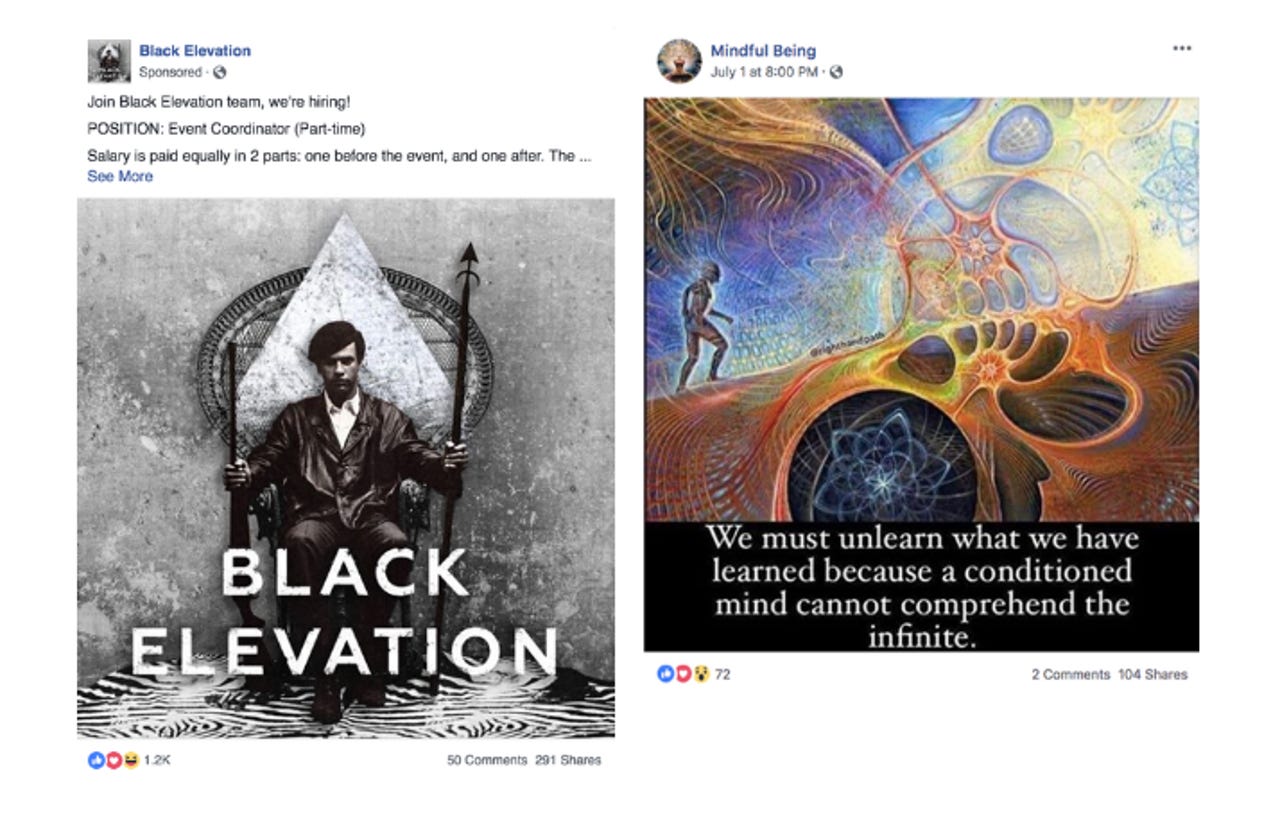Facebook reveals new covert efforts to sway 2018 midterm elections


An example of suspicious accounts removed by Facebook.
Facebook on Tuesday revealed that it's uncovered a covert campaign of misinformation designed to influence the upcoming US midterm elections.
Featured
The social network isn't saying who's behind the campaign, noting that it doesn't have the technical evidence at this time to confidently point a finger. However, the company says it's banned 32 "bad actors" that violate Facebook's ban on coordinated inauthentic behavior. This includes both Facebook pages and Instagram accounts.
Facebook didn't elaborate on the misleading content being spread, but said the banned pages include "Aztlan Warriors," "Black Elevation," "Mindful Being," and "Resisters." More than 290,000 accounts followed at least one of these pages.
During a media briefing today, Facebook's chief information security officer Alex Stamos said the network behind these accounts did more to conceal their identities than the Russia-backed Internet Research Agency did in 2016, including using VPNs and internet phone services, and paying third parties to place ads on their behalf.
Still, Facebook said it's possible that this latest campaign is actually the IRA with improved techniques. In fact, Facebook found connections between some of the new suspicious accounts and previously identified IRA accounts. In one case, a known IRA account was listed as an administrator on a Facebook page controlled by the newly banned group.
The Internet Research Agency was one of the three Russian entities listed in Special Counsel Robert Mueller's election meddling indictment earlier this year. The indictment accused the IRA of seeking, in part, "to conduct what it called 'information warfare against the United States of America' through fictitious US personas on social media platforms and other Internet-based media."
READ: Who's to blame for that cyberattack? Here's why nobody's really sure
It's worth noting that Senator Mark Warner, a ranking member of the Senate Select Committee on Intelligence, issued a statement immediately following Facebook's disclosure that outright blames this new coordinated network of misinformation on Russia and the Kremlin.
"Today's disclosure is further evidence that the Kremlin continues to exploit platforms like Facebook to sow division and spread disinformation, and I am glad that Facebook is taking some steps to pinpoint and address this activity," Warner said. "I also expect Facebook, along with other platform companies, will continue to identify Russian troll activity and to work with Congress on updating our laws to better protect our democracy in the future."
Facebook's latest revelation follows CEO Mark Zuckerberg's testimony in April when he promised greater transparency and responsibility as part of its plan to rebuild public trust damaged by the Cambridge Analytica scandal and fears that Facebook had become a tool for spreading Russian propaganda during the 2016 US presidential election.
"We face determined, well-funded adversaries who will never give up and are constantly changing tactics. It's an arms race and we need to constantly improve too," Facebook said in its statement today. "It's why we're investing heavily in more people and better technology to prevent bad actors misusing Facebook -- as well as working much more closely with law enforcement and other tech companies to better understand the threats we face."
RELATED:
Senator proposes Google, Facebook outline what your data is worth to their platforms
In a policy paper, U.S. Senator Mark Warner says that disclosing what a consumer's data is worth to a platform would be the ultimate in price transparency for "free" services.
Twitter releases tool to improve political ad transparency
Ad Transparency Center provides information about how much advertisers spent and what factors they used for targeting demographics.
Facebook's fake account crackdown: Our AI spots nudity, hate, terror before you do
Facebook's new report attempts to convey how effective its AI is at flagging bad content and fake accounts.
Data firm leaks 48 million user profiles it scraped from Facebook, LinkedIn, others
Exclusive: Profile data was scraped without user consent or knowledge to "build a three-dimensional picture" on millions of people.